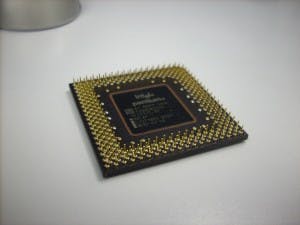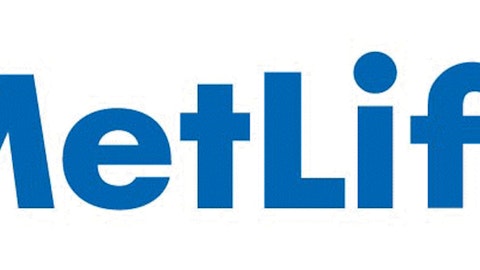Instead of Houston we have a problem, maybe the call should be Intel Corporation (NASDAQ:INTC) we have a problem. I’ve been a fan of Intel until recently, but the company’s recent earnings look worrisome. I love stocks with growth and income, so you would think Intel’s nearly 4% yield, and 11% expected earnings growth, would be right up my alley. However, when I read their earnings report, I am left scratching my head.

It should be no secret by now that the PC industry is changing. With Windows 8 pushing computer makers toward a more touch-screen interface, and customers choosing tablets and smartphones, Intel’s challenges have been well documented.
I’ve consistently seen articles blasting Intel Corporation (NASDAQ:INTC) for their lack of a presence in mobile devices. However, in most of those articles I’ve also read the analysts suggest that Intel will be fine because they still dominate the data center business. The theory is, Intel can leverage its earnings from the data center division, survive the slowdown in the PC industry, and pick up market share in mobile devices. On paper this theory makes sense, however it may not work out this way.
70% uncertainty
The first question Intel Corporation (NASDAQ:INTC) investors should be asking is, what will the company do about the dramatic slowdown in their PC business? The company has done an admirable job of keeping its revenue losses to a minimum, but income is a different story.
Both Intel and Advanced Micro Devices, Inc. (NYSE:AMD) rely heavily on PC sales for their revenue and earnings. Intel’s PC client group makes up 69% of revenue and 70% of income. In the last quarter, revenue was down just 6%, but income dropped over 28%. The bottom line is, a 28% decrease in income from Intel’s largest source can’t be acceptable.
Don’t worry about PCs, Intel will conquer mobile eventually
A common theme among Intel investors (myself included) is, that Intel will eventually make a push into mobile that will make their PC issues fade into the background. One of the ways the company will make this happen is by outspending everyone on research and development. This leads us to the second question that needs an answer. If Intel spends so much on R&D, why are mobile sales slipping?
Intel may outspend everyone on R&D in absolute dollars, they are not beating everyone when it comes to spending relative to their sales. In the last three months, Intel spent 20.09% of revenue on R&D. Their main competition in the mobile space, ARM Holdings plc (ADR) (NASDAQ:ARMH), spent 28.82% on R&D. Even Advanced Micro Devices, Inc. (NYSE:AMD) outperformed Intel by spending 24.97% on R&D. In fact, among their peers, the only company to underperform on R&D was Texas Instruments Incorporated (NASDAQ:TXN) with a 14.27% spend rate.
This lower percentage of spending on R&D could be part of the reason Intel’s “Other Architecture” sales were down. I understand that Intel will need time to win business in the mobile space, but a 9% decline in revenue makes me question if the company is headed in the right direction.
Where is the cash going?
One way that Intel Corporation (NASDAQ:INTC) leads their traditional competitors is in the area of gross margin. This quarter’s gross margin was 56%. By comparison, ARM Holdings plc (ADR) (NASDAQ:ARMH) gross margin was 94.47%, but this is due to the fact that ARM licenses its technology. However, Intel easily beats both Advanced Micro Devices, Inc. (NYSE:AMD)’s gross margin of 15.41% and Texas Instruments Incorporated (NASDAQ:TXN) at 48.54%.
With a high gross margin, investors have come to expect good cash flow from the king of chips. However, this leads us to the third question investors need to ask. With all of Intel’s share repurchases, why are diluted shares down a paltry 0.3% year-over-year?
Intel produced what I call “core operating cash flow” (net income + depreciation) of $3.727 billion in the last quarter. What is disconcerting is, this was down 9.3% from last year. By comparison, ARM’s core operating cash flow was up 48.08% in the last year. While AMD reported negative operating cash flow, even Texas Instruments Incorporated (NASDAQ:TXN) outperformed Intel with a drop of 5.94%.
If we look at core free cash flow (net income + depreciation – capital expenditures), Intel’s payout ratio is 71.73%. This leads us to question number four. If Intel Corporation (NASDAQ:INTC) is such a great dividend play, how can the company increase the yield, when the payout already exceeds 70%?
One final question
In light of all of these challenges, the final question is, do you believe in Intel’s management? If you believe in the company, this is a blip on the radar. If you have questions, what about other stocks? I know some would suggest ARM Holdings plc (ADR) (NASDAQ:ARMH) is a better alternative, but at 45 times 2013 estimates and almost 35 times 2014 estimates, ARM is too rich for my blood.
Advanced Micro Devices, Inc. (NYSE:AMD) has been, and seemingly will be, the red headed step child to Intel. The company faces Intel’s same challenges, but has no data center strength to fall back on. You can boil AMD’s problems down to one comparison. In the last quarter, the company made $1.235 billion in gross profit, and spent $1.354 billion on R&D. When you can’t afford your R&D, the stock won’t go far.
Texas Instruments Incorporated (NASDAQ:TXN) would be a good choice at a lower price. The stock pays a nice 3.27% yield, but a 7.67% growth rate should not equate to a 21 forward P/E ratio. Intel Corporation (NASDAQ:INTC) trades for a low multiple of 11.9 and pays a nice 4% yield. However, if the company can’t solve its PC problem and get mobile moving, analysts might be crazy to expect 11% EPS growth. I’m holding on for now, but I’m beginning to get worried.
The article These 5 Questions Need Answers originally appeared on Fool.com and is written by Chad Henage.
Copyright © 1995 – 2013 The Motley Fool, LLC. All rights reserved. The Motley Fool has a disclosure policy.


